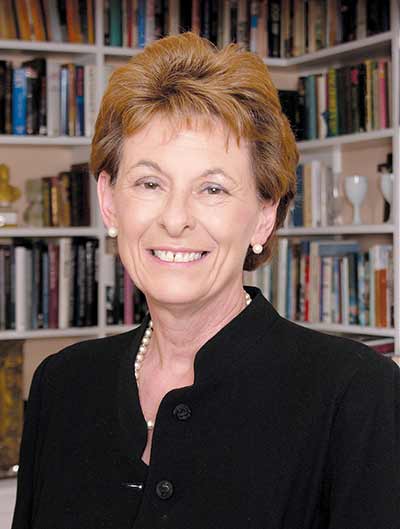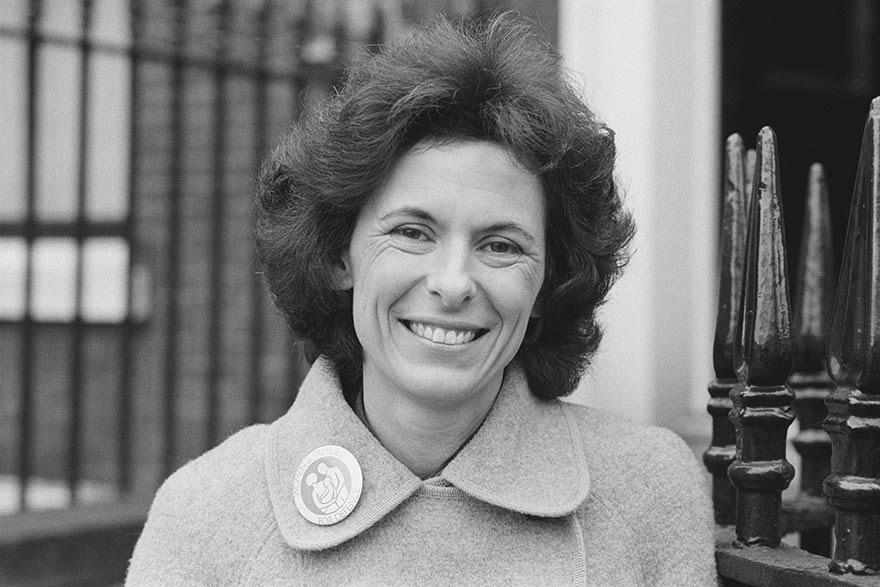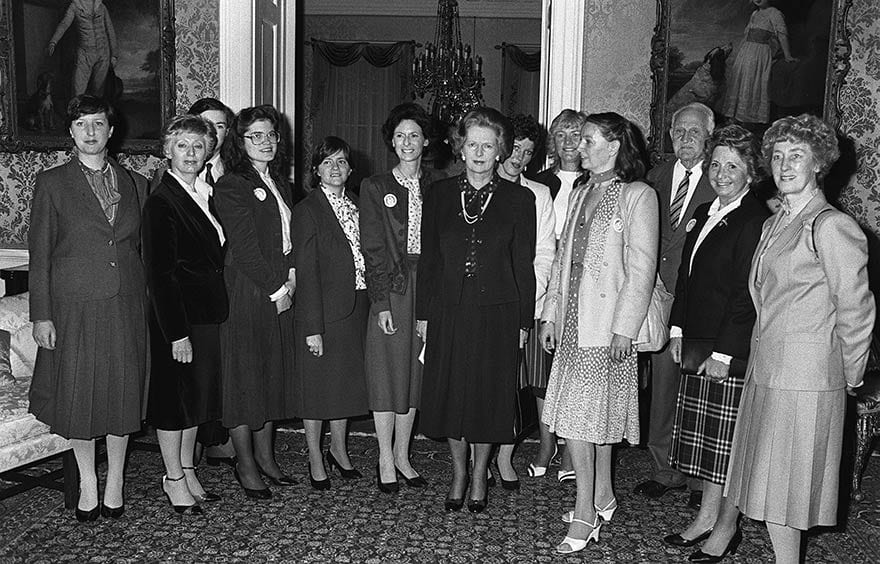Like many others – from current UK Prime Minister Boris Johnson to her own father – Lady Olga Maitland followed the career path of a journalist turned politician, who later also become a security expert. As a stateswoman, she was once involved with the issue of the former Yugoslavia, which is a country of her origin from her mother’s side. She is coming to Belgrade this September, to refresh her memories.
If our interlocutor, Lady Olga Maitland, manages to come to Belgrade in September, as she was planning at the time of this interview, her colleagues – politicians, journalists, and security experts – may struggle to decide how to portray her. She is a British Conservative politician, a former Member of Parliament for Sutton and Cheam, but throughout her career, she has worked intermittently as a politician and a journalist, following the path of her father, Patrick Maitland, the 17th Earl of Lauderdale. During times when this was more of an exception than common practice, she became a prominent female figure involved in top security issues.
In this interview, we took the opportunity to ask questions related to all parts of her career and to seek her opinions regarding many contemporary issues related to politics, journalism and security. For example, knowing that she served in 1996–97 as Parliamentary Private Secretary to Sir John Wheeler, then Minister of State for Northern Ireland in the Northern Ireland Office, we asked for her opinion about the possible effects of Brexit on border issues between Northern Ireland and the Republic of Ireland.

Considering that she’s held all ranks as a journalist of various media outlets, including the Fleet Street News Agency, the Blackheath & District Reporter, and The Sunday Express, and that she is currently a contributor to The Daily Mail, we addressed some hot topics, such as fake news and press freedom.
For those interested in gender equality in defence, let’s say that after being engaged in the topic during her career as an MP, it was in 1983 that our interlocutor founded, and later chaired, Families for Defence – a campaign group tasked with promoting national self-defence capabilities. That group morphed into the Defence and Security Forum in 1992, a security policy thinktank that she presides over and which has been engaged in many different parts of the world.
During her time as an MP, she served as a member of the Yugoslav Parliamentary Group, which gave her the opportunity to better acquaint herself with the country of origin of her mother Stanka (née Lozanić), daughter of Serbian chemist Milivoje S. Lozanić and granddaughter of Sima Lozanić, also a renowned Serbian chemist, president of the Royal Serbian Academy and the first president of Belgrade University. We loved hearing her thoughts about her Serbian family.
I’ve enjoyed my life. I’ve been very privileged, with a wonderful heritage that played a huge part in my whole life. If it weren’t for my parents, I wouldn’t be who I am today. My family was always the rock of my life
Maitland hasn’t just had a rich career in her own right. She’s also married to Robin William Patrick Hamilton Hay, M.A., LL.B., a barrister who later became a Crown Court Recorder, and has two sons – Alastair and Fergus – and a daughter – Camilla – and as many as nine grandchildren. Some of her close relatives on the Serbian side still live in Belgrade and, not surprisingly, are also journalists.
Being a journalist and a politician would be a rare combination in Serbia. What compelled you to switch between those two professions?
Politics and journalism have always been a natural combination in the UK. Journalism is a great asset if you are a politician because it gives you the means to look at any issue with a critical eye, to ask questions and persist in getting answers. These traits are very important for any politician. To listen, to learn, to hear, and then obviously to interpret. Being a politician with a career in journalism is quite common in our politics. Take, for example, Prime Minister Boris Johnston, who was a journalist and went on from that position to become a Member of Parliament and then-Mayor of London.

My career was no different, I was a journalist, and then I always wanted to be a politician. I am of the older generation, and I never thought it would be possible, but when I got into my thirties, I decided I would give it a try, and I finally became an elected politician when I was 48. I had been a working journalist until that time.
My late father was also a journalist who became a politician. He worked with all the major newspapers during World War II. He was correspondent of The Times newspaper for the Balkans and spent some time in Belgrade, before returning to Poland. So, journalism has always been in our family. Indeed, my father later became a politician, a Member of Parliament up in Scotland for eight years, and then a few years later he went into the House of Lords, where he served for 40 years.
That’s very interesting because in Serbia I would say that people will say that if somebody is a journalist they cannot take a political stance and at the same time remain impartial.
Well, I was politically neutral before I became a politician. Also, for example, when Boris Johnson was a journalist writing for The Daily Telegraph, everybody knew his political stance, and he was actually writing for the same newspaper, which he’s now, of course, had to stop doing as prime minister. But there is no harm in that. In fact, there are a lot of positives if you happen to be a politician who knows how to write and how to communicate. Clearly it is a major asset.
How has journalism – with its ethics, interests and position in the social leader – changed over the century? Which impressions do you have from the times when your father was an editor in The Fleet Street Letter Service and The Whitehall Letter?
The medium of communication has changed. We now communicate through social media like Twitter, we write articles that go out on the internet and don’t necessarily get printed in the newspapers so much. Readership levels of newspapers have dropped because people now get their information through electronic media.
We will always be working and communicating, just in a different way. When I began working in journalism there were very strict rules about being factually correct and accurate. Those rules were very much controlled by the professionalism of journalism and the legal system. And people had the right to complain, the right to seek compensation if their reputation was damaged. But today, sadly, the media – the fake media – have really distorted the news and made it much more difficult for people to know which news story is true and what is factually correct. And this is particularly commonplace on social media.
There is no reason why women can’t be security experts; they do it increasingly and do it extremely well
President Trump is a classic example of using social media, Twitter and putting out factually incorrect information, and he gets away with it. So that is dangerous. The other side of the coin is that there is much more television, much more radio coverage, and therefore people are interviewed. They might not tell the truth, but at least you are able to get them interviewed.
The journalism profession used to have a better status in society. Do you think that, in your early career, journalists felt more comfortable than they do today, when even well-established media outlets, such as The Guardian, are fighting for their place under the sun and journalists increasingly find themselves among precarious sections of the workforce?
I think they are respected; they certainly are in this country (UK). They have a very important role to play. In an open, democratic society, you have to have freedom of speech and the right to be able to question the decision making of the government. If you have a country, let’s say Turkey, that has closed down the freedom of the media, social media will raise.
The point of my question was more that the financial status of journalists isn’t good. For example, when I look at The Guardian, it now has a completely different way of financing itself.
You are right. First of all, journalists never had big salaries, they never do. They earn a very average salary. Newspapers and the media rely on advertising to get their money. Print newspapers, like The Guardian, don’t have much advertising, but they rely on people paying subscriptions. So there are different ways of funding the media. However, I would say that journalism isn’t a profession for everybody…if you are a millionaire, you don’t become a journalist; you do it due to a belief in what you are doing.
From your perspective as both a politician and a journalist, do you feel that people in the UK had enough facts at their disposal to make an informed decision about Brexit?
No, they did not. This is really where the campaign blocked out the truth, and there’s no doubt about it. In the Brexit campaign, various people that wanted to leave the European Union used a lot of factually inaccurate information, and they tried to make… I can give you endless examples – say, that Britain would save 350 million pounds a week if it left the European Union.

Well, that figure doesn’t exist, because while we do contribute to the European Union, they also pay back to us. So, there are a lot of distortions and inaccuracies. The European Union had a difficult battle because it is always a challenge to assure people that the current situation is the best. People like looking at something new and fresh, and they were excited by the idea ‘We can go it alone without Europe’, ignoring the reality that Europe is a good Europe … There are a lot of areas where Europe can adjust to operate better, but by and large, it functions well.
There was a lot of misinformation; disinformation being put out and then we saw racism rising on the basis of migrant issues … which made the whole situation even more difficult. So, the Brexit campaign was very difficult and indeed today, nearly three years on, people say ‘I voted to leave, but I had no idea what was involved, and if I had known I wouldn’t have voted’. So that was a very difficult campaign, and I hope it will never be repeated.
Being familiar with the situation in Ireland, and as someone knowledgeable about security issues, how do you feel about the changes Brexit will bring to the border between Northern Ireland and the Republic of Ireland?
Nobody knows right now how the Northern Ireland issue will finally be resolved. The problem now is that Northern Ireland wanted to stay within the European Union. Due to the difficulties that the borderline may bring, they didn’t want to have a formal border with the EU. The question is whether we let them remain within the European Union when they are part of a UK that is withdrawing.
There are many different interpretations and analyses about how the Northern Ireland issue will be solved. Former Prime Minister Theresa May thought that a soft border would be a solution, but other people say they don’t think that we can rely on technology, and if we do, then it would be a loose border. There are a lot of politics coming into it at the moment, and Boris Johnson has not come up with an answer.
Many years have passed since I’ve been to Belgrade, but there is a new generation that brings hope, and I think that’s terrific
And nobody has. So we are stuck. It is not easy to say ‘Okay, let’s now leave on 29th March’, but there are other issues as well. I think we will rely on the technology. It won’t be perfect, I suspect there will be a degree of smuggling going on, but I think this will be a final decision.
Judging from your own career, what do you think women bring to theory and practise with regard to defence and security deliberations?
Well, let me give you some very good news. In the UK, we have a woman defence minister. Germany had a woman defence minister. And I think there’s no doubt that women make excellent security experts. I know many well-qualified women in the security world, in think thanks, dealing with Middle East units or security units. There is no reason why women can’t do it; they do it increasingly and do it extremely well.
You are no stranger to many places that have been in some sort of uproar, from Algeria to the former Yugoslavia. As an initiator of the British Business Council in Algeria, how would you rate that country’s prospects for a peaceful and prosperous future?
[Laughs] I have always taken an interest in countries. Now, Yugoslavia is, of course, my heritage, and I hope Serbia will one day become a member of the European Union; I think it should be. But there are a lot of issues to sort out before that. Algeria is an interesting country; it’s enormously rich and has been rather distanced from the world; it’s a socialist country and socialism ultimately never produces a good economy, which is why they have the current revolution going on.
Do you have time to follow what is going on in Serbia?
Well, I would love to have more time. I tried endlessly over the years to forge relationships with your ambassadors in London, but – frankly – they never responded, so I gave up. But I think there are a lot of positives that I see in the work of Crown Prince Alexander, for example. I am still part of the Serbian community in London, and it is amazing to see how many people now have second homes in Belgrade and want to go back there.
How well do you know your Serbian heritage, and how much does it mean to you? Have you been engaged in Serbian issues since Yugoslavia collapsed?
My Serbian heritage means an enormous amount to me. Interestingly enough, I was brought up equally in the Orthodox faith as in the Anglican faith, so as an Anglican I am totally at home with the Orthodox church and we celebrated all the great Orthodox Church feasts throughout my childhood. We went to the Serbian Orthodox church in Belgravia in London.
Over the years, a lot of my relatives have left Belgrade, but I still have a very dear cousin living in Belgrade. I hope that when I go in September I will get to renew all my old relationships and visit the sites where my family lived. You may know my cousin Boško Čolak Antić, who is a journalist and interpreter. I’ve always admired him, as he is a very special person.